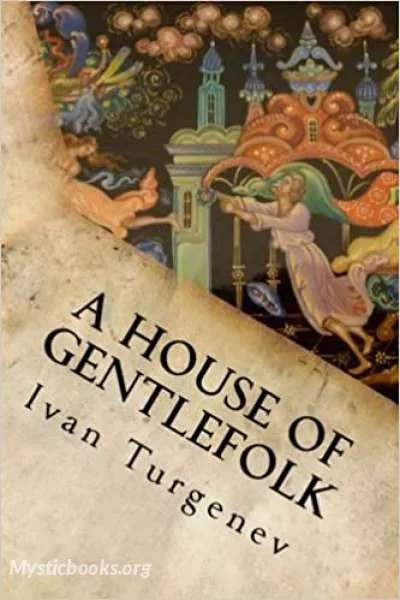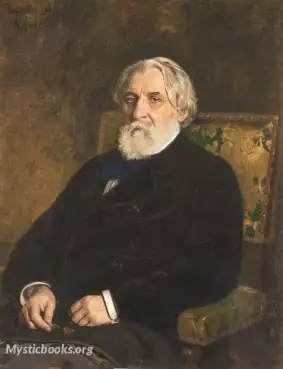
A House of Gentlefolk
'A House of Gentlefolk' Summary
The novel's protagonist is Fyodor Ivanych Lavretsky, a nobleman who shares many traits with Turgenev. The child of a distant, Anglophile father and a serf mother who dies when he is very young, Lavretsky is brought up at his family's country estate home by a severe maiden aunt, often thought to be based on Turgenev's own mother, who was known for her cruelty.
Lavretsky pursues an education in Moscow, and while he is studying there, he spies a beautiful young woman at the opera. Her name is Varvara Pavlovna, and he falls in love with her and asks for her hand in marriage. Following their wedding, the two move to Paris, where Varvara Pavlovna becomes a very popular salon hostess and begins an affair with one of her frequent visitors. Lavretsky learns of the affair only when he discovers a note written to her by her lover. Shocked by her betrayal, he severs all contact with her and returns to his family estate.
Upon returning to Russia, Lavretsky visits his cousin, Marya Dmitrievna Kalitina, who lives with her two daughters, Liza and Lenochka. Lavretsky is immediately drawn to Liza, whose serious nature and religious devotion stand in contrast to the coquettish Varvara Pavlovna's social consciousness. Lavretsky realizes that he is falling in love with Liza, and when he reads in a foreign journal that Varvara Pavlovna has died, he confesses his love to her and learns that she loves him in return.
After they confess their love to one another, Lavretsky returns home to find his supposedly dead wife waiting for him in his foyer. It turns out that the reports of her death were false, and that she has fallen out of favor with her friends and needs more money from Lavretsky.
Upon learning of Varvara Pavlovna's sudden appearance, Liza decides to join a remote convent and lives out the rest of her days as a nun. Lavretsky visits her at the convent one time and catches a glimpse of her as she is walking from choir to choir. The novel ends with an epilogue which takes place eight years later, in which Lavretsky returns to Liza's house and finds that, although many things have changed, there are elements such as the piano and the garden that are the same. Lavretsky finds comfort in his memories and is able to see the meaning and even the beauty in his personal pain.
Book Details
Authors

Ivan Turgenev
Russia
Ivan Sergeyevich Turgenev was a Russian novelist, short story writer, poet, playwright, translator and popularizer of Russian literature in the West. His first major publication, a short story collec...
Books by Ivan TurgenevDownload eBooks
Listen/Download Audiobook
- Select Speed
Related books

Contos by José Maria de Eça de Queirós
''Contos de Eça de Queirós'' é uma coleção de doze contos curtos que oferecem uma crítica mordaz à sociedade portuguesa do século XIX, particularmente...

Ruth by Elizabeth Cleghorn Gaskell
Ruth is a young orphan girl working in a respectable sweatshop for the overworked Mrs Mason. She is selected to go to a ball to repair torn dresses. A...

William -- The Fourth by Richmal Crompton
In this, William and his gang of friends find themselves embroiled in a series of comic mishaps and misunderstandings. From mistaken identities to sec...

The Isle of Dead Ships by Crittenden Marriott
It tells the story of an American journalist named Jerry Delaney, who is sent to the island of Malta to investigate a series of mysterious disappearan...

Actress in High Life: An Episode in Winter Quarters by Susan Petigru King-Bowen
Set in Portugal during the winter of 1812, 'Actress in High Life' offers a glimpse into the lives of British officers stationed in Elvas. The story fo...

When the Birds Fly South by Stanton A. Coblentz
Dan Prescott, a fearless American adventurer, stumbles upon the hidden valley of Sobul nestled within the mountainous terrain of Afghanistan. This sec...

Hypocritical Romance, and Other Stories by Caroline Ticknor
This collection of twelve delightful short stories offers a glimpse into the marriage market of the American Gilded Age. Written with wit and humor, t...

The Junior Classics Volume 1: Fairy and Wonder Tales by William Patten
The purpose of The Junior Classics is to provide, in ten volumes containing about five thousand pages, a classified collection of tales, stories, and...

Those Barren Leaves by Aldous Huxley
**Those Barren Leaves** is a satirical novel by Aldous Huxley that explores the lives of a group of wealthy and sophisticated individuals who gather i...

Iolanthe by W. S. Gilbert
In the realm of the fairies, where mortals are forbidden, a love story blossoms that defies the boundaries of the ethereal and the earthly. Iolanthe,...
Reviews for A House of Gentlefolk
No reviews posted or approved, yet...